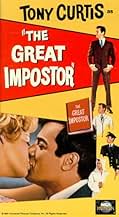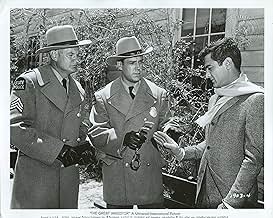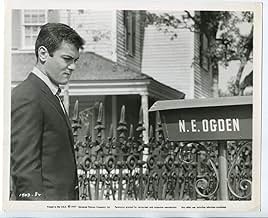IMDb RATING
6.9/10
1.8K
YOUR RATING
Ferdinand Waldo Demara Jr. is a versatile man who gets his kicks out of impersonating a marine, a monk, a navy surgeon and a prison warden, eventually getting in trouble with the law for it.Ferdinand Waldo Demara Jr. is a versatile man who gets his kicks out of impersonating a marine, a monk, a navy surgeon and a prison warden, eventually getting in trouble with the law for it.Ferdinand Waldo Demara Jr. is a versatile man who gets his kicks out of impersonating a marine, a monk, a navy surgeon and a prison warden, eventually getting in trouble with the law for it.
- Awards
- 2 nominations total
Dick Sargent
- Hotchkiss
- (as Richard Sargent)
Robert Crawford Jr.
- Fred Demara Jr.
- (as Robert Crawford)
- Director
- Writers
- All cast & crew
- Production, box office & more at IMDbPro
Featured reviews
After a detailed reading R. Crichton's, " The Great Imposter," and viewing the movie, it becomes quite obvious that the movie only loosely follows Demara's actual charades and exploits. As a matter of fact, several of scenes in the movie: 1) The manure farmer- police car chase was fictitious, 2) Demara also impersonated Dr. Robert Litton French, as a Professor of Philosophy at Gannon University, 3) As Dr. Cecil Boyce Haman, a candidate for first year law courses at Northwestern University Law School, 4) Demara also enrolled in 10 Catholic monasteries across the county, under assumed identities, using forged documents. He either quit because they were catching on, or he could not endure the physical and spiritual demands of that order, 5) His impersonation in the Royal Canadian Navy was that of Canadian, Harvard-educated Dr. Joseph Cyr, whose complete academic records and personal history he acquired when they were fellow brothers at the "Brothers of Christian Instruction" in Maine. Demara was known then as "Brother John."
The sad irony of Demara's life was that he had the intellect to adapt, learn, survive and prosper in the systems and roles he assumed. He actually did the jobs perhaps equally to, or better than the individuals he impersonated, because he actually believed he had more to prove, to substantiate his value and authenticity. He actually gave more in dedication, effort and work to improve the jobs and positions he impersonated, than he took.
Demara believed he was fighting against an unfair, unjust and discriminatory system, which "starting point" judged a person not by their intellect, personal motivation, character, or ability to do the job,... but solely upon their academic credentials. Demara believed that, if you played by the rules, you either died as a hero, or lived long enough to see yourself become a villain. That the only sensible way to live in this world is without rules. Demara's impersonation of Surgeon Lt. Joe Cyr of the Royal Canadian Navy was the high point, and greatest challenge of his persona. He learned in 4 months reading medical books the equivalent of 5 years of medical school. He could read surgical procedures, memorize, and repeat them to perfection on the operating table.
His greatest disgrace was being uncovered after he completed 19 consecutive life saving surgeries on severely injured Korean War commando team members, when his meritorious actions were broadcast across the entire Canadian and American news media spectrum. Equally devastating was his loss of Lt. Nursing Sister Catherine Lacey, whom he deeply loved and intended to marry after resigning his commission from the RCN, upon his return from Korea.
Demara died at the age of 60, a miserable, lonely and broken man, who never got over loosing Catherine...who had only himself to blame.
The sad irony of Demara's life was that he had the intellect to adapt, learn, survive and prosper in the systems and roles he assumed. He actually did the jobs perhaps equally to, or better than the individuals he impersonated, because he actually believed he had more to prove, to substantiate his value and authenticity. He actually gave more in dedication, effort and work to improve the jobs and positions he impersonated, than he took.
Demara believed he was fighting against an unfair, unjust and discriminatory system, which "starting point" judged a person not by their intellect, personal motivation, character, or ability to do the job,... but solely upon their academic credentials. Demara believed that, if you played by the rules, you either died as a hero, or lived long enough to see yourself become a villain. That the only sensible way to live in this world is without rules. Demara's impersonation of Surgeon Lt. Joe Cyr of the Royal Canadian Navy was the high point, and greatest challenge of his persona. He learned in 4 months reading medical books the equivalent of 5 years of medical school. He could read surgical procedures, memorize, and repeat them to perfection on the operating table.
His greatest disgrace was being uncovered after he completed 19 consecutive life saving surgeries on severely injured Korean War commando team members, when his meritorious actions were broadcast across the entire Canadian and American news media spectrum. Equally devastating was his loss of Lt. Nursing Sister Catherine Lacey, whom he deeply loved and intended to marry after resigning his commission from the RCN, upon his return from Korea.
Demara died at the age of 60, a miserable, lonely and broken man, who never got over loosing Catherine...who had only himself to blame.
10clifh
I can not imagine why this movie has not been released on DVD. When it first came out I went to see it several times. When it is on TV I always watch it. Not only is the story and performance of Curtis great, the music score is memorable.
This very interesting film was based upon a book of the same name, in turn, based upon the extremely unorthodox life of Ferdinand Demara.
Watching this film naturally leads us to the question of what motivated Demana to lead this semi-criminal life? Is he a compulsive snake?: one who must periodically shed his skin because he needs new types of challenges periodically to avoid boredom? Or is he playing a cat and mouse game, periodically testing whether he can, once again, beat the system in assuming the identity of someone else? I suspect some of both. Unlike as shown in the film, he actually joined a monastery for several years when he ran away from home at age 16. I would think it extremely unusual for a restless teen to do so. I think that should tell us something about his psychological state.
There is always the problem of a few people who meet the bureaucratic requirements for a profession or advanced schooling but lack real life competency vs. those who are or show promise of being quite competent but lack the bureaucratic criteria for being accepted as an advanced student or as a professional.
The film dramatizes only a few of Demara's impersonations, albeit some of the most astounding. His attempt to reform the typical brutality in prisons was one highlight. However, his masquerading as a doctor in the Canadian Navy during the Korean war is the most unbelievable segment. Included is his historical surgery on several wounded Koreans while aboard ship.
I wonder if he had gotten married if he would have settled down? The fact that he tried to make it as a monk in his early adulthood may suggest that he didn't have marriage in his plans. Incidentally, Sue Anne Langdon sure was cute and vivacious as an aggressive man eater!
Demana is shown faking a suicide. This really happened.
I'm very surprised that this film was shot in B&W at this late date(1961), although Universal was a notoriously cheap studio.
Watching this film naturally leads us to the question of what motivated Demana to lead this semi-criminal life? Is he a compulsive snake?: one who must periodically shed his skin because he needs new types of challenges periodically to avoid boredom? Or is he playing a cat and mouse game, periodically testing whether he can, once again, beat the system in assuming the identity of someone else? I suspect some of both. Unlike as shown in the film, he actually joined a monastery for several years when he ran away from home at age 16. I would think it extremely unusual for a restless teen to do so. I think that should tell us something about his psychological state.
There is always the problem of a few people who meet the bureaucratic requirements for a profession or advanced schooling but lack real life competency vs. those who are or show promise of being quite competent but lack the bureaucratic criteria for being accepted as an advanced student or as a professional.
The film dramatizes only a few of Demara's impersonations, albeit some of the most astounding. His attempt to reform the typical brutality in prisons was one highlight. However, his masquerading as a doctor in the Canadian Navy during the Korean war is the most unbelievable segment. Included is his historical surgery on several wounded Koreans while aboard ship.
I wonder if he had gotten married if he would have settled down? The fact that he tried to make it as a monk in his early adulthood may suggest that he didn't have marriage in his plans. Incidentally, Sue Anne Langdon sure was cute and vivacious as an aggressive man eater!
Demana is shown faking a suicide. This really happened.
I'm very surprised that this film was shot in B&W at this late date(1961), although Universal was a notoriously cheap studio.
That this movie, made in 1961, wasn't the inspiration for Frank Abagnale (Catch me if you can), the bit Spielberg/DeCaprio/Hanks hit currently in theaters. When I saw the promos for CMIYC I thought, "Hey! This is a remake of an old Tony Curtis film!"
The IMDB search shows that The Great Impostor was made in 1961; Frank Abagnales adventures as an imposter started in '62 or '63. Wonder if he saw the film?
I can't remember if I loved The Great Impostor or not but I'm guessing I did; the plot is sooooooooo similar to Catch Me If You Can and I liked that film quite a lot!
The IMDB search shows that The Great Impostor was made in 1961; Frank Abagnales adventures as an imposter started in '62 or '63. Wonder if he saw the film?
I can't remember if I loved The Great Impostor or not but I'm guessing I did; the plot is sooooooooo similar to Catch Me If You Can and I liked that film quite a lot!
Tony Curtis portrays "Ferdinand Waldo Demara Jr.," who faked being a doctor, warden, monk and teacher. When I saw this at the theater 45 years ago, I thought it was fascinating. Much older and seeing it on tape about 10 years ago, it wasn't as interesting as I had remembered. I guess when you're a kid, everything on the big screen is impressive.
Humor helped in this film, giving it some life here and there as it's a bit slow-moving but still entertaining. I've usually found Curtis entertaining to watch, a man who played a lot of interesting characters. I still think he is/was an underrated actor, too.
It was nice seeing the main character, although being a fake, still asking for God's help in certain situations, inside knowing he was not doing the right thing. Those parts would be edited out if the film was re-made today. I agree, too, with a fellow reviewer that faking being a surgeon is not something to be laughed at, especially if he was doing his operating on you or me!
Humor helped in this film, giving it some life here and there as it's a bit slow-moving but still entertaining. I've usually found Curtis entertaining to watch, a man who played a lot of interesting characters. I still think he is/was an underrated actor, too.
It was nice seeing the main character, although being a fake, still asking for God's help in certain situations, inside knowing he was not doing the right thing. Those parts would be edited out if the film was re-made today. I agree, too, with a fellow reviewer that faking being a surgeon is not something to be laughed at, especially if he was doing his operating on you or me!
Did you know
- TriviaTony Curtis as Demara is shown boarding HMCS Cayuga (a Tribal Class destroyer), which was the actual ship the real Demara sailed in.
- GoofsDemara is assigned to HMCS Cayuga on 16 June 1951. However, in the Captain's cabin, there is a picture on the wall of Queen Elizabeth II, who ascended the throne on 6 February 1952 on the death of her father, King George VI. Also, the portrait appears to be the 1956 Pietro Annigoni painting of the queen.
- Quotes
Ferdinand Waldo Demara Jr.: Help me dear God, I don't want to kill anybody.
- ConnectionsFeatured in The UnXplained: Leading Double Lives (2020)
- How long is The Great Impostor?Powered by Alexa
Details
- Release date
- Country of origin
- Languages
- Also known as
- Ein charmanter Hochstapler
- Filming locations
- Los Angeles, California, USA(Griffith Park)
- Production company
- See more company credits at IMDbPro
- Runtime
- 1h 53m(113 min)
- Color
- Aspect ratio
- 1.85 : 1
Contribute to this page
Suggest an edit or add missing content












































